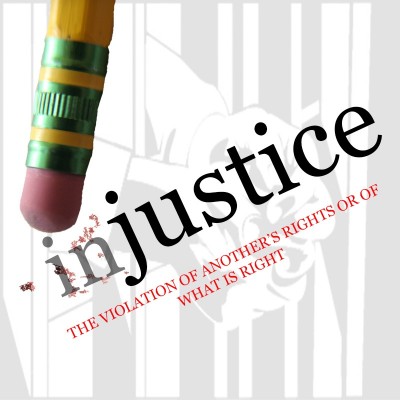The Burglar, The Vigilante, and The Axe of Justice
“He saw me. I wasn’t even in the room and he shot me. He shot me through the open door.” What Troy Singleton had just experienced was the instant of thunder, blinding flash, and burning flesh of a 9 mm pistol shot right at his face.
Troy, you see, was the ‘cemetery burglar’ of twenty-four years ago. Only at the time it was ‘the hotel room burglar.’ In the winter of 1990, a rash of burglaries at Key West hotels had brought the hotel /motel industry to the edge of hysteria. Tourists were waking up in their rooms to realize someone had stolen their money and valuables while they were sleeping. The hotel room burglar was said, in the Key West Citizen, to “threaten not only the community but the entire tourist industry.”
Twenty-four years later, still serving time on his 35-year burglary sentence, Troy Singleton says he now knows who that hotel room burglar really was. In fact, he has a signed confession from the guy, a man named Willie Lee Rose. He also claims his trial was rigged and this week he filed a Writ of Habeas Corpus which is pending before Judge Louis Garcia, for violation of his civil rights.
This is Troy’s story:
“Gus said, ‘There’s been too many break-ins. I’m going to sit there in a room and wait for him,’” recalls Christina Grassi, who was the front desk clerk at the Bayside Inn on January 30, 1990. She told The Blue Paper that her boss, Gus Zapetero, then took his gun from under the counter and went off to set a trap to catch the hotel room burglar.
“I didn’t think much of it at the time. We had about 150 rooms. What were the chances that of all the hotel rooms in Key West the burglar would choose the one where Gus was waiting?”
Zapetero’s decision reflects the near-panic mode adopted by the hotel industry at the time. Jack Smith, then head of the Hotel/Motel Association, was quoted in the Citizen saying, “Everyone is competing for the tourist dollar. We must protect our investment.” Hotel owners showed up in force at a City Commission meeting asking for the appointment of a special police task force. The resolution was unanimously adopted. “Crime deters tourism,” said Gerry Tinlin, of H.M.A.
“At about four O’clock in the morning,” recalls Grassi, “Gus came running back to the office shouting, ‘I got him! I got him! The police are coming!’”
“What a coincidence,” says Grassi, “I looked at the room. I remember the walkway in front of the room was dark; either Gus had taken the light out or he chose that room because there was no light.”
The police didn’t like Zapetero’s story very much. For one there was no proof of a break-in, no theft, no blood in the room, no bullet hole in the wall.
“They said they couldn’t find the bullet,” says Grassi, “The problem was Gus was not really defending his room, or his things. He didn’t have anything in that room. He just wanted to kill the burglar.”
The bullet hit Troy in the jaw and came out through his cheek on the opposite side. Troy jumped over the railing, dropped from the second floor, ran through the grounds and somehow made it to his then-girlfriend’s house. She took him to Depoo Hospital in her car and that’s where the police found him.
Now, the system was in a pickle. On the one hand Zapetero was a vigilante. There was plenty of evidence that he had set a trap and shot Troy, not while inside the room, but while he was outside on the public walkway. The police wanted Zapetero prosecuted. But on the other hand, a lot of people were ready to give Zapetero a medal and put his kids through college.
Worse, if Zapetero was indicted, he would probably plead the Fifth which would mean there would be no actual witness to Troy’s “attempted burglary” at the Bayside Inn. No blood, no bullet, no witness, no stolen property. But could Kirk Zuelch, then state attorney, afford not to prosecute the presumed ‘hotel room burglar’?
So, the police went back to have a look at Troy’s girlfriend’s car. In the car they found $ 150 in traveler’s checks and a video camera that had been reported stolen from another hotel. Troy claims the items were left in the car by a man who he had given a ride to, but couldn’t identify. Troy says, he’s since found the man in prison [Willie Lee Rose] and he’s admitted, in a signed affidavit, to having committed the burglary and to putting the loot in Troy’s girlfriend’s car.
The case went to trial and 22-year-old Troy, who had never been involved in any type of violent crime, was sentenced to 35 years in prison. “I cried at my desk at work when I heard he got 35 years,” said Grassi. I don’t think he deserved to be shot in the face or to go to jail for 35 years. I don’t think that was fair.”
“Troy was never the hotel room burglar,” says Sheila Butler, Troy’s friend since childhood, “The burglaries kept happening after Troy went to jail. They just needed a conviction.”
But Troy Singleton might have a chance at freedom. “The state combined the two cases. That’s how they pulled it off,” said Troy in a telephone interview from prison. “When they realized the case about the camera and stuff in the car was not going to make it, they brought in the Bayside Inn case. Neither case could stand on its own. In one they had me at the hotel but there was no theft and no break-in had occurred. In the other case they had stolen goods from another hotel but no direct link to me. But when put together each case worked enough prejudice on the jury to bridge the gap and the Judge and the public defender let them do it.”
Troy, who says he has spent years educating himself in the prison law library, claims that the Judge allowed the prosecutor to try him for a case that he was not even charged with.
“The ‘information’ is the notice to the defendant of what he’ll be accused of during the trial. It may be the most important step in due process,” says Troy, “without it the Judge has no jurisdiction; no right to hear the case at all. But I was convicted of a burglary of the Bayside Inn and that charge was not in the information. In fact it had been specifically removed. I am asking the Judge to rule that due process was violated and to let me go home to my family.”
The documents reviewed by the The Blue Paper show that the state entered a ‘nole prosequi’ [declined to prosecute] in the case at the Bayside Inn and filed a new information, accusing Singleton of burglary at the other hotel and theft of the items found in the car. But nonetheless there was a guilty verdict entered for a burglary at the Bayside Inn.
 Sheila Butler, who is now Troy’s girlfriend, has helped him create a website, asking for ‘Justice For Troy Singleton’ where she posts messages from Troy and shares court documents that support his claim for freedom.
Sheila Butler, who is now Troy’s girlfriend, has helped him create a website, asking for ‘Justice For Troy Singleton’ where she posts messages from Troy and shares court documents that support his claim for freedom.
Was the judicial system under too much pressure to convict someone of being the ‘hotel room burglar’? Troy was certainly no angel, at 22 he had already been arrested and convicted for burglary and theft once before and he was addicted to cocaine.
“I am not trying to deny my responsibility,” says Troy, “I had no business at the Bayside Inn at 4:00 in the morning, but I’ve done plenty of time, 24 years, and I had nothing to do with stealing the things the police found in my girlfriend’s car.”
Troy’s two previous convictions for burglary/theft and the sale of cocaine allowed the prosecutor to request that he be sentenced under the “habitual offender” guidelines: 35-years in prison.
The mandatory sentencing system is coming under fire more and more [see article in The Economist, Oct 1 2014, ‘The Kings of the Courtroom’] Under the pressure of mandatory sentencing innocent people plead to lesser charges rather than taking the risk of conviction and offenders are sentenced to disproportionate punishments.
The November 2013 ACLU report, ‘A Living Death: Life Without Parole For Non-Violent Offenses’ is astounding:
Timothy Jackson is serving life without parole for shoplifting a jacket worth $ 159 from a Maison Blanche department store in New Orleans. For a first offender it would carry a six-month sentence. Instead, the court sentenced Jackson to mandatory life without parole, using a two-decades-old juvenile conviction for simple (unarmed) robbery and two simple car-burglary convictions.
“In 1996 police found a safe in Stephanie George’s house containing 500 g of cocaine. She said it belonged to her ex-boyfriend, who had the key and admitted that it was his. Prosecutors could have charged Ms. George with a minor offence: she was obviously too broke to be a drug kingpin. Instead they charged her for everything in the safe, as well as everything her ex-boyfriend had recently sold – and for obstruction of justice because she denied all knowledge of his dealings. She received a mandatory sentence of life without the possibility of parole. Her ex-boyfriend received a lighter penalty because he testified that he had paid her to let him use her house to store drugs. Ms. George was released in April, after 17 years, only because [President] Barack Obama commuted her sentence.” – The Economist, Oct 1 2014, ‘The Kings of the Courtroom’
“Nobody will admit it,” says Sheila, “but this is modern day slavery. All these guys are working for free while in prison. When they’re too old to work they get released on parole.”
Troy’s case is now in the hands of Judge Luis Garcia. Stay tuned.


Another wonderfully “balanced” account from the Blue Paper….NOT !!
35 years IS a long time to spend in jail, at the tax payers expense for the crime of theft…but we aren’t talking about one-time offenders. The culprit even admits, himself, that he “had no business being at the Bayside Inn at 4AM”…to me, that’s a confession! He was there because he was stealing stuff. Were the stolen goods in his girlfriend’s car stolen by him? Maybe not. But if they weren’t, they were there because his partner had stolen them and left them in the car they were sharing in their crime spree. I believe the whole “Hotel Room Burglar” thing was not one, but many criminals robbing hotel rooms on their own. Copy cats who took advantage of a series of independent thefts and turned the whole thing into a circus. And I strongly suspect that Troy just happened to be the only one caught. But that doesn’t excuse him! A thief is a thief, whether they steal some skittles or the hope diamond, and a habitual offender has proven that s/he cannot help themselves…”release me and I’ll do it again”. So we can’t release them. They should just be happy they’re relatively safe here in the US of A, where you get three meals and a bed for 35 years, rather than getting their hand cut off…
Jim, the point is the length of the sentence. We the taxpayers pay a fortune to keep people in prisons, which have become a major US industry. Data show that many who commit crimes in their 20’s become more law abiding as they age.
Also, we should distinguish between violent and property crimes. If you give 25-35 for robbery, what are you going to give for rape and murder? Kill the perp’s mom as well as him?
Jim, do you also defend the sentence given to the girl who had her ex-boyfriend’s dope? The life sentence for the shoplifter?
These extreme sentences do little to deter crime, compared to say a 10-year sentence during the criminals’ worst years in his 20’s. They challenge our Constitution’s prohibition of “cruel and unusual punishment.” And Jim, they cost you and me twice as much per year as it would cost to send someone to college BEFORE they began committing crimes.
Thanks, Rick. You said it for me. Revenge is very expensive and doesn’t work. The three-strikes-you’re-out laws are an insult to judges and juries that are far better equipped to decide appropriate sentencing. Let courts decide, not lobbyists hired by the corporate prison/industrial complex.